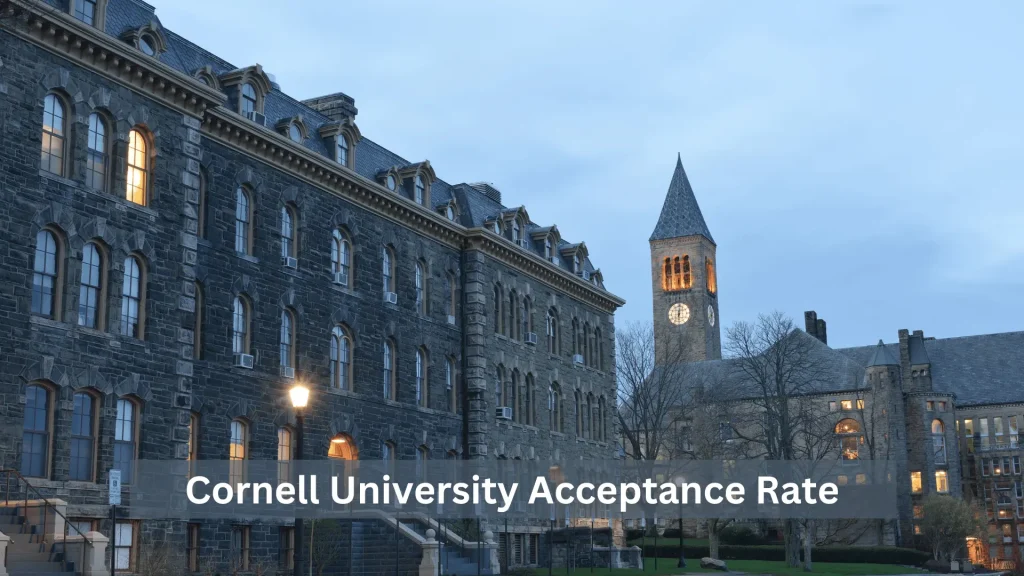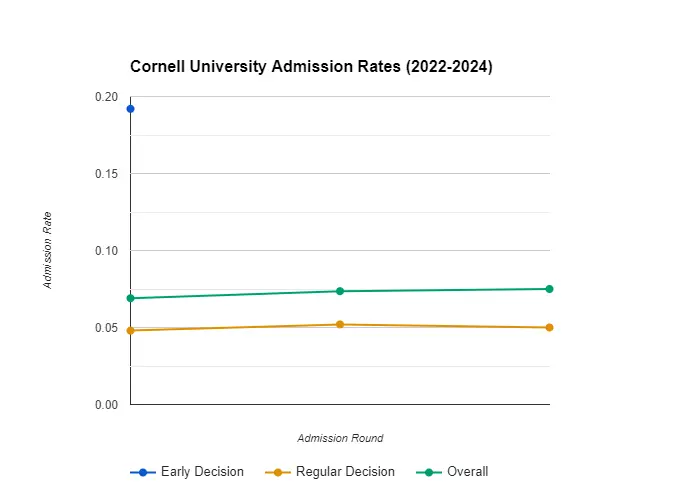Cornell University Acceptance Rate for 2024 and previous years highlight notable trends in college admissions. A blend of academic performance, extracurricular involvement, and demographic factors has influenced these rates. Understanding these patterns provides valuable insights for prospective students aiming to navigate the increasingly competitive application process.

Cornell University Acceptance Rate
Here’s the statistical data on Cornell University’s acceptance rate for 2024 and previous years:
2024: The acceptance rate was 10.7%.
2023: The acceptance rate was 10.6%.
2022: The acceptance rate was 10.3%.
2021: The acceptance rate was 12.5%.
2020: The acceptance rate was 13.9%.
Cornell University Transfer Acceptance Rate
Here’s the statistical data on Cornell University’s transfer acceptance rate for 2024 and previous years:
2024: The transfer acceptance rate was 16.7%.
2023: The transfer acceptance rate was 17.1%.
2022: The transfer acceptance rate was 15.7%.
2021: The transfer acceptance rate was 18.6%.
2020: The transfer acceptance rate was 18.5%.
How to Get into the Cornell University
Getting into Cornell University, one of the Ivy League schools, is a highly competitive process. Here are some guidelines and strategies to help you increase your chances of admission:
Academic Excellence
GPA and Class Rank
- Aim for a High GPA: Cornell looks for students who have excelled academically. Aim for a GPA of 3.9 or higher to be competitive.
- Top Class Rank: Being in the top 10% of your high school class can significantly enhance your application.
Challenging Coursework
AP, IB, and Honors Courses: Enroll in Advanced Placement (AP), International Baccalaureate (IB), and honors courses to show that you are capable of handling rigorous academic work.
STEM and Humanities Balance: Take a balanced mix of STEM (Science, Technology, Engineering, Mathematics) and humanities courses to showcase your versatility.
Extracurricular Activities
Leadership Roles
Student Organizations: Take on leadership roles in student government, clubs, or organizations.
Community Service: Engage in meaningful community service projects to demonstrate your commitment to making a difference.
Unique Talents and Achievements
Special Skills: Highlight any unique talents or achievements, whether in sports, arts, music, or other areas.
Awards and Recognitions: Include any awards or recognitions you have received at the local, state, national, or international levels.
Personal Statement and Essays
Authentic and Reflective Writing
Be Authentic: Write essays that reflect your true personality, passions, and experiences.
Specific to Cornell: Tailor your essays to show why you are a good fit for Cornell and how the university can help you achieve your goals.
Letters of Recommendation
Strong Endorsements
Choose Wisely: Select teachers and mentors who know you well and can speak to your strengths and character.
Detailed and Personal: Request letters that provide specific examples of your accomplishments and potential.
University Cornell Percentage Rate
Here is the statistical data about Cornell University’s acceptance rate and transfer acceptance rate for the Class of 2024 and previous years presented in table format:
| Year | Overall Acceptance Rate | Transfer Acceptance Rate |
| 2024 | 10.7% | 16.7% |
| 2023 | 10.6% | 17.1% |
| 2022 | 10.3% | 15.7% |
| 2021 | 12.5% | 18.6% |
| 2020 | 13.9% | 18.5% |
How Many Students Get Accepted to Cornell University?
Here is the data on how many students were accepted to Cornell University for the Class of 2024 and previous years:
| Year | Number of Applicants | Number of Students Accepted | Overall Acceptance Rate |
| 2024 | 51,500 | 5,514 | 10.7% |
| 2023 | 49,114 | 5,330 | 10.6% |
| 2022 | 51,324 | 5,288 | 10.3% |
| 2021 | 47,038 | 5,889 | 12.5% |
| 2020 | 44,966 | 6,277 | 13.9% |
Cornell University College Acceptance Rate
Cornell University, an Ivy League institution, has demonstrated increasing selectivity in its admissions process over recent years. For the Class of 2024, Cornell received 51,500 applications and accepted 5,514 students, resulting in an acceptance rate of 10.7%. This trend of competitive admissions is consistent across previous years, with acceptance rates of 10.6% for the Class of 2023 and 10.3% for the Class of 2022.
Cornell University Admission Rate

Cornell University SAT/ACT Score Requirements
Cornell University has specific SAT and ACT score requirements for prospective students, reflecting its competitive admissions process.
SAT Requirements
Average SAT Score: The average SAT score for admitted students is approximately 1430 on a 1600 scale.
Score Ranges:
25th Percentile: 1330
75th Percentile: 1530
The average breakdown includes:
Math: 730 (with a 25th percentile score of 680 and a 75th percentile score of 780)
Reading: 700 (with a 25th percentile score of 650 and a 75th percentile score of 750).
ACT Requirements
Average ACT Score: The average composite ACT score for admitted students is around 34 out of 36.
Score Ranges:
25th Percentile: 33
75th Percentile: 35
For individual sections:
English: 34 (25th percentile 34, 75th percentile 36)
Math: 32 (25th percentile 32, 75th percentile 35).
University of Florida GPA Requirement
Cornell University does not specify a minimum GPA requirement for admission, but the average GPA of admitted students is typically quite high. According to Campus Reel, the average GPA of admitted students is around 3.15 on a 4.0 scale, though aiming for a GPA closer to 3.31 or higher can be more competitive.
Final Verdict
Cornell University’s acceptance rate for recent admissions cycles has been around 10%, reflecting its highly selective nature. For instance, the acceptance rate for the Class of 2024 was approximately 10.7%, indicating the competitive landscape for applicants. This selectivity is consistent across its various colleges and programs, making it crucial for prospective students to have strong academic records, impressive extracurricular achievements, and compelling personal statements to improve their chances of admission.
FAQs
What is the current acceptance rate for Cornell University?
The acceptance rate for Cornell University fluctuates slightly each year, but it is consistently around 10%. For instance, the acceptance rate for the Class of 2024 was approximately 10.7%.
How has Cornell’s acceptance rate changed over time?
Over recent years, Cornell’s acceptance rate has seen slight variations but generally remains in the low teens. In past years, it has been around 14-15%, but the increasing competitiveness and larger applicant pools have pushed it closer to 10%.
What factors influence Cornell’s acceptance rate?
Several factors influence Cornell’s acceptance rate, including the number of applicants, the academic and extracurricular qualifications of the applicant pool, and the university’s commitment to maintaining a diverse and talented student body.
